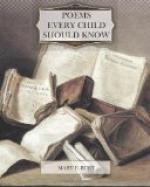King Francis was a hearty king, and loved a royal sport,
And one day as his lions fought, sat looking on the court;
The nobles filled the benches, with the ladies in their pride,
And ’mong them sat the Count de Lorge with one for whom he sighed:
And truly ’twas a gallant thing to see that crowning show,
Valour, and love, and a king above, and the royal beasts below.
Ramp’d and roar’d the
lions, with horrid laughing jaws;
They bit, they glared, gave blows like beams,
a wind
went with their paws;
With wallowing might and stifled roar they rolled
on one another,
Till all the pit with sand and mane was in a thunderous
smother;
The bloody foam above the bars came whisking through
the air;
Said Francis then, “Faith, gentlemen, we’re
better here than there.”
De Lorge’s love o’erheard the King,—a beauteous lively dame
With smiling lips and sharp, bright eyes, which always seem’d the same:
She thought, “The Count, my lover, is brave as brave can be;
He surely would do wondrous things to show his love of me;
King, ladies, lovers, all look on; the occasion is divine;
I’ll drop my glove, to prove his love; great glory will be mine.”
She dropped her glove, to prove
his love, then look’d
at him and smiled;
He bowed, and in a moment leapt among the lions
wild:
His leap was quick, return was quick, he has regain’d
his place,
Then threw the glove, but not with love, right
in the lady’s face.
“Well done!” cried Francis, “bravely
done!” and he rose
from where he sat:
“No love,” quoth he, “but vanity,
sets love a task like that.”
LEIGH HUNT.
THE WELL OF ST. KEYNE.
I found the Well of St. Keyne in Cornwall,
England—not the poem, but
the real well. The poem is of the great body
of world-lore. Southey
(1774-1843).
A well there is in the west
country,
And a clearer
one never was seen;
There is not a wife in the
west-country
But has heard
of the Well of St. Keyne.
An oak and an elm tree stand
beside,
And behind does
an ash tree grow,
And a willow from the bank
above
Droops to the
water below.
A traveller came to the Well
of St. Keyne:
Pleasant it was
to his eye,
For from cock-crow he had
been travelling
And there was
not a cloud in the sky.
He drank of the water so cool
and clear,
For thirsty and
hot was he,
And he sat down upon the bank,
Under the willow
tree.
There came a man from the
neighbouring town
At the well to
fill his pail;
On the well-side he rested
it,
And bade the stranger
hail.
“Now, art thou a bachelor,
stranger?” quoth he,
“For an if thou
hast a wife,
The happiest draught thou
hast drunk this day
That ever thou
didst in thy life.




